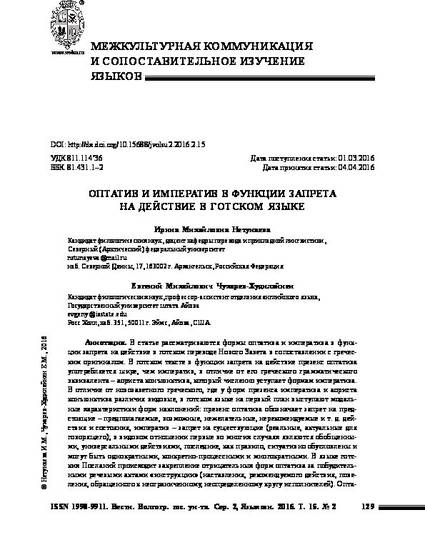
In the Greek original text of the New Testament, prohibitions are expressed with two negative verb forms: the present imperative and the aorist conjunctive. The grammatical equivalents of these two forms in Gothic are the imperative and the present optative, respectfully. However, we do not find a one-to-one verb form mapping from Greek onto Gothic in Wulfila's translation of the Bible. Statistically, in prohibition contexts in Gothic, the optative is more frequently used than the imperative, while in Greek, on the contrary, the imperative is more frequent than the conjunctive. In this article, we argue that Greek and Gothic differ in the grammatical functions of verb moods used to express prohibitions. Through an analysis of a representative sample of contexts, we demonstrate that, while in Greek the distinction between the present imperative and the aorist conjunctive is aspectual, in Gothic the distinction between the imperative and the present optative is modal. Specifically, the Gothic optative is used when the prohibited actions and states are potential (i.e., upcoming, possible, undesirable, non-recommended, etc.); the Gothic imperative, on the other hand, is used to express prohibitions of real (vs. potential) actions, from the speaker's viewpoint, and encouragement that such actions be terminated. In terms of the aspect, the former actions and states in many cases are general and universal (vs. occasion-specific), while the latter can be one-time, repeated, or ongoing actions. In the Gothic language of the Epistles, the optative mood is further specialized in expressing the "instructional" speech acts (teachings, recommendations, commandments, which are directed towards an unlimited and indefinite circle of addressees) and is mainly used in paraenetic contexts, wherein in the Greek original both the imperative and the conjunctive forms are used.
Available at: http://works.bepress.com/evgeny-chukharev-hudilainen/13/

This article is published as Netunayeva I.M. and Chukharev-Нudilainen E. Optativ i imperativ v funkcii zapreta na dejstvie v gotskom jazyke (= Optative and imperative prohibitions in Gothic). Vestnik Volgogradskogo gosudarstvennogo universiteta. Ser. 2. Jazykoznanie (Science Journal of Volgograd State University. Linguistics), 15, no. 2 (2016): 129-137. (in Russian). DOI: 10.15688/jvolsu2.2016.2.15. Posted with permission.